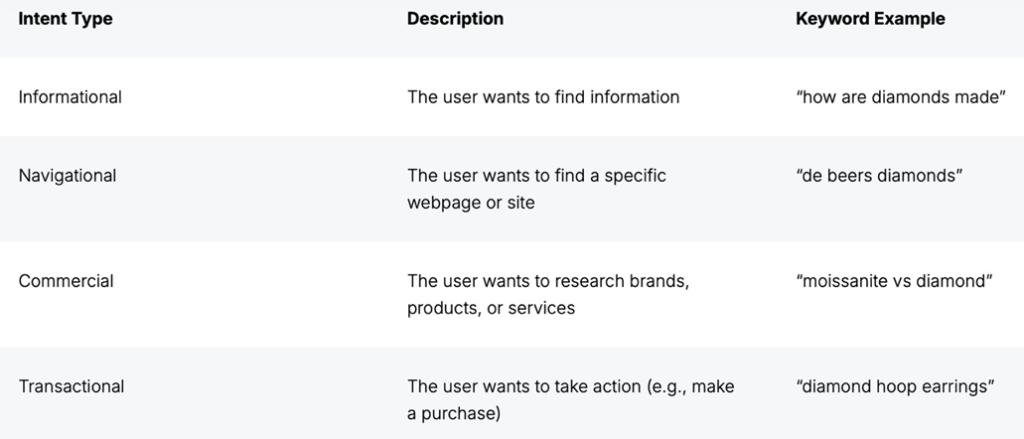
Author: Monique Holtman

Topic: SEO

Time to read: 15 minutes
Keywords are the words or phrases we type into search engines to find the product, service or content we’re looking for.
It’s not just consumers who rely on keywords, however – they’re very important for any business with a website.
With the ability to drive targeted traffic to your website for free, there’s absolutely no doubt that using the right keywords can skyrocket your business to online sales success.
Topics we’ll cover:
- Are keywords still important for SEO?
- Should I still be using keywords?
- Keyword best practices
1. Are keywords still important for SEO?
Ten years ago, it was common practice to stuff a website full of keywords and wait to start ranking for them. Believe it or not, this technique actually worked. With Google becoming increasingly intuitive about keyword stuffing however, one of the oldest SEO tricks in the book soon fell out of favour.
Where does this leave us now? Are keywords still relevant and should we be using them?
The simple answer to this is yes, keywords are still important for SEO. Their role has evolved however, and we need to ensure we’re using them correctly.
First and foremost, Google no longer tolerates keyword stuffing. It considers it to be a manipulative SEO technique and could cause more harm than good. The practice involves adding lots of keywords to your website, with little regard to producing good quality content, in a bid to manipulate search engine rankings.
Considered a ‘black hat’ SEO technique, the consequences may include a drop in search engine rankings, a decrease in traffic and a negative experience for users of your website. Lots of great techniques for using keywords safely and effectively are shared in section three, keyword best practices.
Another critical point to consider is that while keywords are still important, they’re no longer the only factor when it comes to determining search rankings. Google prioritises high-quality content which genuinely addresses the needs of the reader. This is otherwise referred to as user intent.
User intent: rather than simply matching users to a website based on their search query, Google aims to deliver results that will best satisfy the user’s intent. This means understanding whether the user is looking for information, if they want to make a purchase or if they’re seeking a solution to a problem.
Let’s use the phrase ‘best shoes for running’ for example. A user searching this term might be looking for product reviews, comparisons or recommendations, not just a generic post about running shoes. To rank well, websites must align their content with the intent of their readers.
This has been further highlighted by the introduction of AI. With the ability to analyse the context and meaning behind search queries, AI enables us to better understand user intent, going way beyond basic keyword matching. We share some top tips for using AI as part of your keyword strategy in section three, keyword best practices.
While there’s no doubt that focusing solely on keywords is an outdated practice, it doesn’t mean that they should be ignored completely. Keywords remain highly relevant and effective, providing we know how to use them.
2. Should I still be using keywords?
How important are keywords in SEO and should we still be using them?
As a business owner, every investment of time and money needs to deliver real value. When it comes to SEO, you want to ensure you’re using strategies that drive results. To help you determine if this keyword-focused approach is right for your business, I’ve compiled a list of pros and cons.
Pros
Increased visibility
By targeting relevant keywords, your website is more likely to appear in search results, driving more traffic to your website.
You can increase conversion rates
The starting ground for producing great content is understanding which keywords are driving traffic to your website. If you run Google Ads, you will be able to check this in your Analytics account. By finding out what your audience is interested in, you will then be able to write engaging content around these topics.
Not only will relevant content attract visitors, it will do so in larger volumes. What’s more, if your copy is meaningful to those who read it, there’s a very high possibility it will lead to higher conversions.
They provide you with valuable insights into current trends
When we’re deciding which keywords to use, most of us tend to stick to a keyword research tool. While this is a great way to work out which are the best phrases to use, Google Trends can help you utilise your keywords further and take your content to the next level.
Analysing keywords will offer you insights into current marketing trends and consumer behaviour. By keeping up to date with what’s popular and important to your audience, you can use this to ensure that your content and keywords remain competitive.
Keywords are great for SEO
Although the way we use keywords has changed, it doesn’t mean that their purpose has. Keywords remain incredibly important to SEO for a number of reasons:
- They help Google to identify what your website is about.
- They ensure that your content is displayed to the right people at the right time.
- They’re a great way of driving traffic to your website.
- They can be used on other channels such as your social media pages. The hashtags you use on your Instagram posts for example should be the same keywords you want your website to rank for.
Cons
Google can penalise you for keyword stuffing
Overusing keywords in your content can make it sound unnatural and negatively impact user experience. Prioritising keyword density over creating valuable content can result in low-quality content which doesn’t resonate with readers. As well as losing potential customers, this can also lead to search engine penalties and lower rankings.
It’s not just Google that won’t look upon your content too favourably either if you’re predominately aiming for high keyword density, it’s unlikely that your content is going to read well and engage your audience. When writing blogs and website content, user experience should be a bigger priority because it relates directly to conversion and retention rates.
You end up focusing on the wrong results
Another issue with becoming so heavily involved in keywords is that you can end up focusing on the wrong results. The sole aim of keywords is to improve rankings. It doesn’t, however, take into account the quality of the traffic coming to your site, how long people spent reading your content and most importantly, if they converted.
You’re better off getting 10 good quality visitors to your website who will eventually convert into paying customers than you are getting 500 hits but nothing comes of it.
Algorithm updates
Search engines constantly update their algorithms, which can sometimes devalue certain keyword strategies. As with any SEO strategy, it’s a good idea to stay up to date with the latest best practices (which have been highlighted below.)
Key takeaway
While keywords are still important for SEO, the modern approach is to use them strategically. This should be done while prioritising high-quality content which naturally incorporates relevant keywords and addresses user intent.
3. Keyword best practices
The question shouldn’t be ‘how important are keywords in SEO?’ It should be, ‘how do we use keywords to ensure they’re effective?’
If you’re familiar with SEO, you’ll know that best practices are constantly changing and can be hard to stay on top of.
Below I’ve highlighted the top keyword best practices for 2025.
Use a good keyword research tool
The foundation of good keyword research starts with the right tools. Google’s Keyword Planner is one of the most popular options available. It’s simple to use, gives you an insight into trends and best of all, it’s free. You can use it to:
- Get keyword ideas and discover new keywords related to your business.
- Estimate bids.
- See how keywords might perform.
- Choose competitive bids and budgets.
- See how much it will cost you to target specific keywords.
To use Google’s Keyword Planner, you need a Google Ads account. If you don’t already have one, you can create one for free.
To use the tool, you simply type in a word or phrase such as ‘vegan cookbooks.’ It will then provide you with all the information you need to decide if it’s a good term to use. Generally, you can expect the more searches a keyword gets, the higher the competition for it will be. This means that you will be competing against a lot of other websites to rank for the term. This means it will be more difficult to rank highly in the likes of Google, and it’s likely to cost you more money too.

With this in mind, it’s also worth looking at lesser used terms. ’15-minute vegan recipes’ only gets 70 searches per month but the competition is low which means that you’re actually more likely to get traffic from it.
Filter keywords for intent
As I mentioned earlier, user intent now plays a big role in keyword effectiveness. Keywords can reflect a variety of intents. For example, ‘property services’ could be used by a homeowner looking to sell or rent their property, a prospective buyer/tenant looking for a home, or a landlord who needs help managing their rental property.
Semrush isn’t a free tool but it’s great if you’re taking your keyword research seriously. Its keyword intent feature identifies the intent behind a keyword search by labelling it with an abbreviation which could be either informational intent, navigational intent, commercial intent or transactional intent.
Semrush has a great breakdown of the meaning of the four different intents.

Image source: https://www.semrush.com/blog/what-are-keywords/
Embrace AI
AI is revolutionising digital marketing by enabling us to create highly personalised customer experiences. Data analysis, real-time insights and better targeting techniques allow businesses to gain a thorough understanding of customer behaviour and therefore deliver more relevant content.
Keyword research is no exception to the rule. There are a number of ways AI can be used for this SEO strategy:
- It can brainstorm a large list of keywords related to your topic, including long-tail keywords and related search terms.
- It can help interpret the user’s intent behind a search query, allowing you to tailor your content to address specific needs.
- You can analyse the keywords your competitors are ranking for and incorporate any relevant phrases into your content.
- It can create topic clusters for you.
Examples of some of the tools available which use AI for keyword research include:
- Semrush
- Google Keyword Planner
- Ahrefs
- Surfer SEO
While AI can be a very insightful tool, human oversight is still needed. Always review and refine any keyword suggestions to ensure they align with your target audience and business goals.
Use long tail keywords
Long tail keywords are slightly longer than your average search term and are much more specific. Using the example above, more people may type ‘vegan cookbooks’ into Google but ’15-minute vegan recipes’ is going to attract much better quality traffic. If someone is searching for something specific and you provide them with this exact information, it’s natural that they’re going to stay on your site for longer which is also great for SEO.
The other benefit of focusing on long tail keywords is that when someone is looking for something so specific, it usually means that they’re ready to buy. If you’re going to a fancy dress party for example and you’re trying to come up with ideas, you’d probably search for something along the lines of ‘fancy dress ideas.’ If you’re searching ‘pirate fancy dress costumes’ however, chances are you’ve made up your mind and you’re looking to buy a suitable outfit.
Aside from being far more likely to convert into sales, competition for long tail keywords is lower which means they’re much easier to rank for.
When you’re doing your keyword research, simply try out different variations of key phrases. As well as looking at search terms, think about what a potential customers’ journey might look like.
Say you’re an accountant based in Maidenhead for example. The keyword ‘accountant’ will no doubt get a lot of searches every month. It’s so generic however, it doesn’t tell Google anything about the user’s intent. Are they looking for an accountant to do their taxes for them? Where are they based? What do they need this accountant to specialise in? Perhaps they’re even thinking about a career in accountancy themselves.
A more specific term such as ‘Tax accountant in Maidenhead’ will get fewer searches, but the results are a lot more relevant. This means that anyone clicking on your website as a result of this search, is far more likely to contact you.

Use Google Trends
By researching keyword trends, you can work out the behaviours of online users. With Google Trends for example, you can identify spikes and fluctuations in certain keyword searches.
When you search a particular word or phrase in Google Trends, you will be presented with a graph which will show you the interest in that term over a certain time period (which you can specify).
If you search the word ‘Christmas’ you get the kind of result you would expect. ‘Christmas’ starts to generate interest from October until it reaches its peak in the days leading up to the 25th of December and then it tails off again.

By identifying the rising and falling popularity of various subjects related to your industry, this can help to identify new keywords, plan your long-term content goals and determine when the best time to publish new content is.
Another great way to use Google Trends is to look at related queries. As well as giving you keyword and content ideas, you can filter the results by rising popularity so you know which topics are generating interest. This is a great way to start ranking for keywords before they become very competitive and it’s also a fantastic way to ensure you’re blogging and talking about topics on social media that you know people want to read about.
If you’re a personal trainer for example, you could type ‘fat loss’ into Google Trends. In the related queries section, you can see the growing keywords related to this topic all of which can prove invaluable when it comes to putting together your content marketing strategy.

Perhaps unsurprisingly, most of the searches related to this are around fat loss injections which are hugely popular at the moment. Although a personal trainer should direct clients to their doctor if they want to discuss this topic, it doesn’t mean they can’t help clients who are already on it. They can for example produce content highlighting the importance of strength training and eating enough protein while taking this drug.
Use keyword clustering
Keyword clustering is where related keywords are grouped together based on their search intent. If you’re writing about ‘running shoes’ for example, you may cluster keywords like ‘comfortable running shoes,’ ‘lightweight running shoes’ and ‘best running shoes for women.’
Benefits of keyword clustering include:
- By targeting a wider range of related keywords, you can attract more potential traffic from search engines.
- Focusing on a cluster of keywords encourages you to create more in-depth and informative content.
- Instead of creating separate pages for each keyword, you can cover multiple related terms on a single page. This certainly makes for more efficient content creation.
In this article, we’ve established:
- Are keywords still important? Yes, but practices have evolved and businesses need to ensure they’re adopting a modern approach with their strategies.
- Why keywords are still important in SEO. Keywords remain highly effective and relevant when it comes to driving quality traffic to websites.
- With the right best practices to hand, business can still enjoy great results with their keyword strategy.